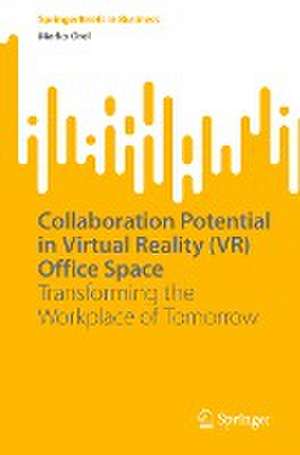Collaboration Potential in Virtual Reality (VR) Office Space: Transforming the Workplace of Tomorrow: SpringerBriefs in Business
Autor Marko Orelen Limba Engleză Paperback – 10 aug 2022
Din seria SpringerBriefs in Business
-
 Preț: 262.86 lei
Preț: 262.86 lei -
 Preț: 382.75 lei
Preț: 382.75 lei -
 Preț: 410.39 lei
Preț: 410.39 lei -
 Preț: 342.74 lei
Preț: 342.74 lei -
 Preț: 380.25 lei
Preț: 380.25 lei -
 Preț: 380.25 lei
Preț: 380.25 lei -
 Preț: 414.21 lei
Preț: 414.21 lei -
 Preț: 476.95 lei
Preț: 476.95 lei -
 Preț: 341.97 lei
Preț: 341.97 lei -
 Preț: 385.84 lei
Preț: 385.84 lei -
 Preț: 345.45 lei
Preț: 345.45 lei -
 Preț: 343.97 lei
Preț: 343.97 lei -
 Preț: 343.98 lei
Preț: 343.98 lei -
 Preț: 378.54 lei
Preț: 378.54 lei -
 Preț: 375.45 lei
Preț: 375.45 lei -
 Preț: 443.75 lei
Preț: 443.75 lei -
 Preț: 444.74 lei
Preț: 444.74 lei -
 Preț: 476.03 lei
Preț: 476.03 lei -
 Preț: 379.48 lei
Preț: 379.48 lei -
 Preț: 340.83 lei
Preț: 340.83 lei -
 Preț: 377.18 lei
Preț: 377.18 lei -
 Preț: 345.50 lei
Preț: 345.50 lei -
 Preț: 378.12 lei
Preț: 378.12 lei -
 Preț: 376.43 lei
Preț: 376.43 lei -
 Preț: 376.59 lei
Preț: 376.59 lei -
 Preț: 374.85 lei
Preț: 374.85 lei -
 Preț: 346.86 lei
Preț: 346.86 lei -
 Preț: 341.64 lei
Preț: 341.64 lei -
 Preț: 341.75 lei
Preț: 341.75 lei -
 Preț: 344.14 lei
Preț: 344.14 lei -
 Preț: 377.18 lei
Preț: 377.18 lei -
 Preț: 377.95 lei
Preț: 377.95 lei -
 Preț: 343.72 lei
Preț: 343.72 lei -
 Preț: 374.08 lei
Preț: 374.08 lei -
 Preț: 375.23 lei
Preț: 375.23 lei -
 Preț: 375.62 lei
Preț: 375.62 lei -
 Preț: 376.43 lei
Preț: 376.43 lei -
 Preț: 377.73 lei
Preț: 377.73 lei -
 Preț: 376.22 lei
Preț: 376.22 lei -
 Preț: 347.31 lei
Preț: 347.31 lei -
 Preț: 376.59 lei
Preț: 376.59 lei -
 Preț: 376.22 lei
Preț: 376.22 lei -
 Preț: 343.72 lei
Preț: 343.72 lei -
 Preț: 383.12 lei
Preț: 383.12 lei -
 Preț: 376.22 lei
Preț: 376.22 lei -
 Preț: 376.22 lei
Preț: 376.22 lei -
 Preț: 342.74 lei
Preț: 342.74 lei -
 Preț: 377.73 lei
Preț: 377.73 lei -
 Preț: 379.09 lei
Preț: 379.09 lei -
 Preț: 377.18 lei
Preț: 377.18 lei
Preț: 410.01 lei
Nou
Puncte Express: 615
Preț estimativ în valută:
78.46€ • 80.94$ • 65.47£
78.46€ • 80.94$ • 65.47£
Carte tipărită la comandă
Livrare economică 26 martie-09 aprilie
Preluare comenzi: 021 569.72.76
Specificații
ISBN-13: 9783031081798
ISBN-10: 303108179X
Pagini: 77
Ilustrații: XIX, 77 p. 5 illus.
Dimensiuni: 155 x 235 x 8 mm
Greutate: 0.15 kg
Ediția:1st ed. 2022
Editura: Springer International Publishing
Colecția Springer
Seria SpringerBriefs in Business
Locul publicării:Cham, Switzerland
ISBN-10: 303108179X
Pagini: 77
Ilustrații: XIX, 77 p. 5 illus.
Dimensiuni: 155 x 235 x 8 mm
Greutate: 0.15 kg
Ediția:1st ed. 2022
Editura: Springer International Publishing
Colecția Springer
Seria SpringerBriefs in Business
Locul publicării:Cham, Switzerland
Cuprins
Dedication.- Foreword.- Preface.- Acknowledgements.- About the Book.- About the Author.- List of Abbreviations.- 1. Introduction.- 2. Transformative Nature of the Knowledge Workspace.- 3. Towards a Digitized Workspace.- 4. The Virtual Reality Workspace.- 5. Concluding Thoughts, Limitations, and Implications for Future Research.
Notă biografică
Marko Orel works as the Head of the Centre for Workplace Research (CWER) and as an Assistant Professor at the Prague University of Economics and Business, Czech Republic. His main research fields are organizational aspects of flexible and open workplaces, workers’ social aspects, and inter-organisational networks development. Throughout his career, Marko has developed a particular interest in immersive technologies that enable users to experience extended reality. His specific focus is on virtual reality, namely in the context of contemporary workplaces and forms of knowledge work. Marko currently lives between Ljubljana and Prague together with his wife and daughter but can be frequently found in different realities and virtual worlds.
Caracteristici
Features in-depth interviews with thought leaders from the virtual reality (VR) industry and academia Explores work digitalization through the use of virtual reality (VR) technology Reviews the limitations of two-dimensional, computer-mediated communication tools on digital workspaces
